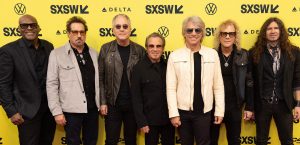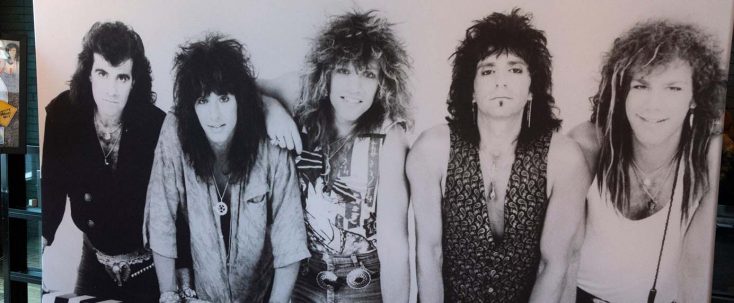
The Cast and EP’s attend the SXSW World Premiere for Hulu’s THANK YOU, GOODNIGHT: THE BON JOVI STORY in Austin, Texas on March 14, 2024. ©Disney/Frank Micelotta.
By JUDY SLOANE
Front Row Features
PASADENA, CA-Hulu’s new four part docuseries “Thank You, Goodnight: The Bon Jovi Story,” chronicles the iconic rock band’s 40 year career and future, as its front-man, singer Jon Bon Jovi, struggles with a vocal cord injury. It’s produced and directed by Emmy award winner Gotham Chopra (“Kobe Bryant’s Muse,” “Man in the Arena.”)
Jon Bon Jovi spoke with the TV Critics Association about his upcoming series that premieres on Hulu this Friday, April 26, 2024.
Q: What made you want to do the documentary and show the tough times as well as the highs?
Jon Bon Jovi: This is the band’s 40th anniversary. I wanted to document what had happened in my past with a vision on what is the future. One thing we agreed upon on day one was this was not going to be a VH1 puff piece. That I wasn’t going to stamp my feet and say, “I have final say.” Gotham was the director. This had to tell the truth and have all the warts to go with it in order to tell a real truth. So I’m proud of the film.
Q: How did you land on “Thank You, Goodnight,” as the title of the documentary?
Jon Bon Jovi: I think that the greatest thing that I say at the end of every night is “Thank you and have a good night. Travel into the darkness, but knowing that there was light shine tonight.”
But the ambiguity of the title is also what does the future hold for me and for my band? That’s a health‑related question. And although I’m making great strides, we faced something that I didn’t expect, which is this vocal cord surgery. Though I’m doing very well and sang for my first time in public just the other night, so I’m feeling good, when we shot this there was no definitive answer. If I can’t go out and do two and a half hours a night, four nights a week, “Thank you, goodnight.”
Q: When you have a career that’s as long-lasting and prolific as yours, change is inevitable. What’s your attitude towards change?
Jon Bon Jovi: There have been many biomarkers along the way, and everything has changed. You have to remember that we were born in an era that didn’t have computers, mobile phones or social media. Our first album was cassette tapes and shortly after eight-track, the advent of the CD and on and on to today’s streaming. I’m able to roll with all the punches. The only thing that hasn’t changed is I’m still at the same label for 40 years.
Q: One of the strengths of your band is whatever differences or issues that you had, you didn’t go to the press or social media. How was it now confronting that with everybody talking about some of the issues that did occur?
Jon Bon Jovi: There are moments of other guys’ truths that are obviously in the film because I wasn’t going to ask for them to be cut out. But, generally speaking, because it’s not a puff piece, you have to accept that. And I think that makes the bonds deeper. By being able to truly speak the truth without fear of repercussion or bruised egos, it makes you appreciate it more.
Q: One of the unexpected things about getting older is that you still feel like you’re 25 inside. How do you wrestle with that emotion?
Jon Bon Jovi: Yeah. It’s not been easy. I pride myself on having been a true vocalist. I’ve sung with Pavarotti. I’ve studied the craft for 40 years. I know how to sing. So when God was taking away my ability, and I couldn’t understand why, I jokingly have said the only thing that’s ever been up my nose is my finger, so there’s no reason for any of this. One of my cords was literally atrophying, and I wasn’t singing well. Fortunately, I found the surgeon who was able to do this cutting-edge implant to build the cord back up, and it’s still in the process. The rest of it I can deal with. I can write you a song; I can perform as well as anybody. But I need to get my tools back. I’m 19 ½ months into my rehab, so I’m a work in progress.
But boy, do we have a great film, and I’ve got a damn good album. And I feel really great about all of it. Give me that last piece of this puzzle, and it’s going to be a joy to go back to work.
Q: What impact does music have on audiences today?
Jon Bon Jovi: Music’s always affected the culture at large. If you go back to Woody Guthrie and Bob Dylan, and “This Land Is Your Land,” “Times They Are A-Changin,” where would the world be without those songs? To this day, where we stand, artists have the opportunity to reflect the world around them if they choose to.
I received a two-page handwritten, long-form letter from President Zelenskyy telling me what “It’s My Life” has meant to the people of Ukraine. Holy sh**. I was just writing that coming from who and where I was at that time. And now, to realize that the effect that some of these songs have had on cultures is humbling.
Q: As a teenager, did you ever dream this big?
Jon Bon Jovi: No. Not in my craziest dreams. This past Friday, I was honored as the MusiCare’s Person of the Year, which is about our catalog of music but also a lot of my philanthropic work. The 18-year-old in me had (at my table,) Paul McCartney to his left and Bruce Springsteen to his right, and I would have never in my wildest dreams believed it.





